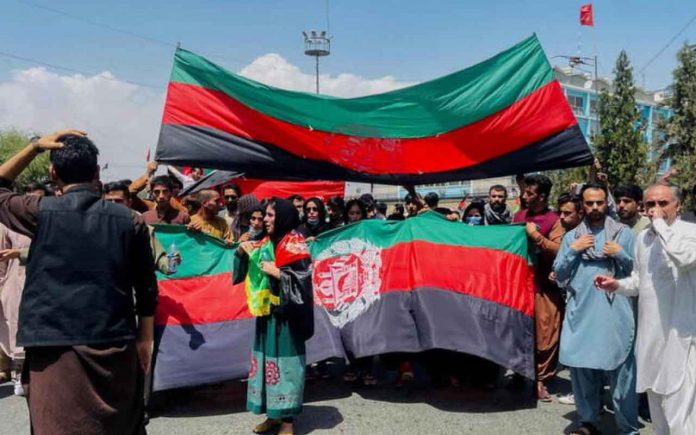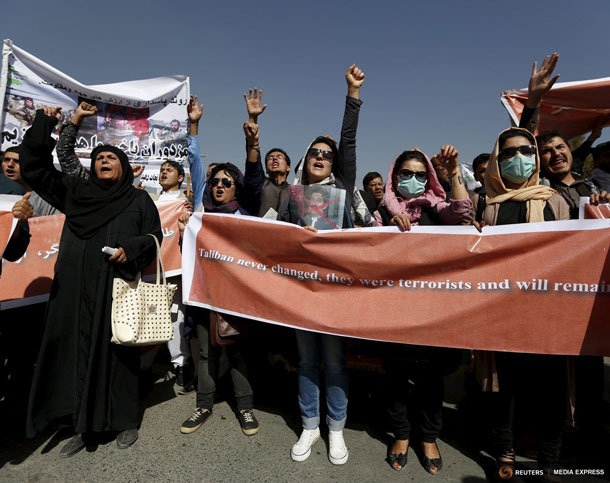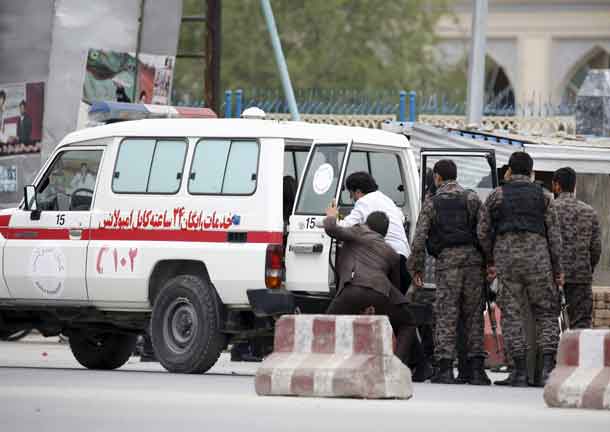Whether they have left Afghanistan or stayed, professional women have seen their lives upended since the Islamist group took over
By Bahaar Joya
LONDON – (Thomson Reuters Foundation) – When the Taliban seized Afghanistan on Aug 15, we asked women from various professions to take a photo marking what could be their last day of work, and to share their thoughts.
As the Taliban mark two months in power, we contacted the women to ask how their lives are now. Whether they have fled Afghanistan or stayed, all have seen dramatic changes.
The Islamist militant group has said it will not repeat the harsh rule of the last Taliban regime, toppled in 2001.
But officials have already announced many restrictions on women’s lives. Girls’ high schools remain closed, while many working women have been told to stay at home.
Here, four women share their experiences with the Thomson Reuters Foundation:
Mujgan Kaveh, former researcher at an international organisation
I’m now in Islamabad with my family waiting to go to the United States.
We were on a U.S. evacuation list, but the Taliban stopped the van taking us to the airport and arrested three men. After that we were very scared and did not return to the airport.
Finally, on September 23, my organisation told me a car would take us to Pakistan. We set out at midnight, reaching the border in the early morning, but the gate was shut. We had to wait 13 hours with thousands of others – the temperature hit 40 degrees (Celsius).
The moment I entered Pakistan I felt free and happy. I was laughing and hugging my daughter and husband.

Taking off my scarf made me feel alive. My daughter asked, ‘Mommy, aren’t they going to beat us for not covering our heads?’. I said, ‘No, you’re free here darling’.
Going to the U.S. will allow me to start a new life for myself and my children, especially my daughter. I cannot imagine her growing up under the Taliban without education or basic rights.
I now understand what it is to feel free and safe. Living in constant fear of your life is something I cannot begin to describe – the last weeks in Kabul were a living hell.
I was checking the news all the time, not sleeping and scared of the doorbell – that it might be the Taliban come to arrest or harm us. I need long-term therapy because I’m not the same person I was two months ago.
Shabnam Popalzi, former journalist and presenter at Parliament TV
I am at home in Kabul. All my friends are in the United States or Europe these days so I stay up until the early hours so that I can talk to them and try to find a way out of the country.
I have not left my home for weeks because I’m too scared to go out on the streets. The Taliban have taken everything from me, including the job I love.
IN PICTURES: Afghan women record their ‘last day at work’
I don’t think there is any future for women like me in Afghanistan. But western countries won’t help me leave because I worked for local media rather than the international media.
I’ve always promoted women’s rights and freedom of speech. How can the international community say that they can’t help me? Is this how they pay back 20 years of our efforts to build a modern Afghanistan?
It isn’t fair to abandon us without a future, or to be killed by the Taliban.
Kabul has drastically changed. The coffee shops and restaurants, which used to be full of young women, are empty – or just have male customers. There are few women on the streets and women’s faces have disappeared from advertising hoardings.
Most women wear black hijabs in the street now. It’s very sad.
It’s a basic right to choose what you wear. I don’t feel comfortable in long dresses. I prefer jeans and shirts. The way we dress as Afghan women is part of our fight for our rights.
Amena Barakzai, principal of a girls’ school in Herat province

When the Taliban came in I feared I would never teach again so I gave a symbolic lesson to an empty classroom. But one week after the takeover the Taliban asked us to come back to work.
It was like a dream for me. The moment I heard we could return I got out my bag and went to school. The last lesson I gave was still on the blackboard. I cried, but at the same time I felt hope that this generation is not going to go backwards.
We will fight for our girls’ right to an education. Although high schools for girls are still closed, primary classes are open.
I and my colleagues are discussing the conditions for reopening high schools with Taliban officials at the education ministry. We’re determined to reopen classes for all girls and won’t give up until that happens.
I was living in Abu Dhabi when the Taliban last came to power. I came back in 2002 to educate the children of my homeland. I won’t leave them without help, especially when so many people are fleeing abroad.
What will happen to the future of the next generation? Who is going to build the nation if we all leave? We have to find a way to work together with the new government to build Afghanistan.
Humaira Saqeb, CEO of Afghan Women’s News Agency which closed when the Taliban took over

I’m in Canada with my family. After the Taliban took over, I went into hiding in a safe house in Kabul. I managed to leave with help from Canadian contacts. We’ve now been here for some weeks, but I feel my life is in ruins.
I cannot sleep at night and have nightmares about how, in the blink of an eye, I’ve lost everything that I built in the last 20 years. I’ve lost my home, my country, my job.
This is the pain I will bear for the rest of my life, the pain of being betrayed by everyone, by our former government, by the international community, by the U.S.
What was the point of spending billions of dollars and sacrificing lives if they wanted to make a deal with the terrorists and sell us to them?
I am a women’s rights activist, and this is my job. No one can take it from me, not even the Taliban. I will continue my job from here with greater tenacity as the women in Afghanistan need me even more now.
I will raise their voices and pressure the international community not to recognise the Taliban government unless they respect women’s rights to education, jobs, political participation and freedom.
We have a duty not to give up on those left behind.
(Editing by Emma Batha. Credit the Thomson Reuters Foundation)







